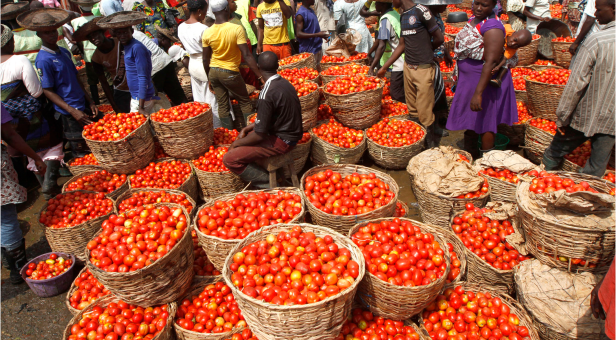Breaking News
Lai Mohammed Blames Boko Haram Terrorists For Tomatoes Scarcity Nationwide

Lai Mohammed, minister of information and culture, has attributed the ongoing tomato scarcity in the country to Boko Haram.
The staple has been very expensive in the last two months as a result of acute scarcity, which the federal government blamed on tuta absoluta, a pest also known as ‘tomato ebola’.
Audu Ogbeh, minister of agriculture, had said the government was making efforts to contain the outbreak which had ravaged six states.
But speaking in an interview on Channels Television, Mohammed said insecurity in the north-east had forced many farmers out of the zone.
“People talk about the price of tomato but they forget one thing; they forget that the price of tomato today is a direct result of the fact that we have lost two years harvest to Boko Haram insurgency,” he said.
“Most of the people you see riding Okada (motorcycles) in Lagos are people who would have been in the farm to produce consumable items.”
When asked if he was convinced that the tomato scarcity could be attributed to insurgency, he said: “Absolutely! Do you farm where there is war? We have lost two seasons of harvest, in addition we have had very poor rainfall last year and this year. These are the combined factors responsible for the scarcity of tomato. Go and ask economists and agriculturists, they will tell you.”
Mohammed also said the prevalence of clashes between farmers and herdsmen was as a result of climate change, saying government refused to heed past warnings on the situation.
“When you look at the herdsmen and farmers clashes, I think its neglect of many years. More than 15, 20 years ago, we were warned all over the world that as a result of climate change there could be conflicts and we should take steps to avert such clashes, but we did not listen,” he said.
“What is happening is that there is a gradual reduction in natural resources. If you take Lake Chad for instance, it has lost almost 90% of its waters over a couple of years and Lake Chad sustained and supported livelihood of farmers and fishers, with the loss of waters, you see a migration southwards. Now government all over the world were warned that these were the consequences of climate change.”
Meanwhile,The scarcity of tomatoes and hike in its price nationwide had been of great concern to many Nigerians this year.
The perishable vegetable, majorly cultivated during dry season, had its price astronomically go up due to many factors and in many states, unavailable.
Consequently, stakeholders gave reasons for the scarcity and the hike in price, as they made suggestions on how to tackle the dearth of the nutrient-packed food item, while government put more efforts to tackle the problem.
The Kebbi chapter of All Farmers Association (AFAN) attributed the scarcity to the lack of improved variety of seedlings to grow the commodity in commercial quantity.
The Secretary of the Association, Alhaji Muhammad Idris, told the News Agency of Nigeria (NAN) in Birnin Kebbi that farmers in the state produced large
quantity of tomatoes but lacked modern methods of its cultivation.
He said “there are modern varieties of tomato seedlings which, if made available to farmers, it will improve yield.
“The seeds currently being planted by farmers had been recycled in the past 20 years; tomato farming is easy but the problem is the lack of consultants to assist farmers on better ways to grow and manage the commodity.
“Traders who come to Kebbi to buy tomatoes now go to Kaduna, Zaria and Zuru to purchase the commodity, where the yield is at least better than here.’’
On his part, the Chairman of the state’s Association of Tomatoes Farmers, Alhaji Abubakar Gado, said the tomatoes scarcity was the result of pest called “tuta absoluta” that destroyed many farms.
In Kaduna State, where the tomato pest destruction was worst, farmers had solicited for assistance from government to minimise their losses.
Some of the farmers said the tuta absoluta pest could destroy farms within hours, adding that they harvested nothing from their fields as a result of the outbreak of the pest and were now living in penury.






